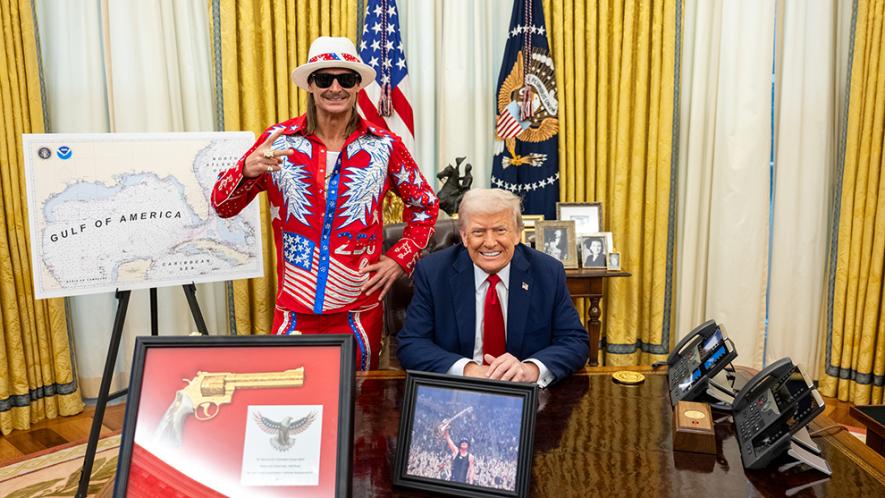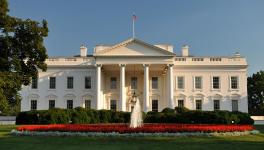Trump And His Impossible Return to Past

President Donald Trump and singer Kid Rock pose in the Oval Office in front of a map labeled "Gulf of America" (Image: The White House)
The radical return to protectionism is not only possible but necessary for an empire facing an undeniable decline. It has been denounced by critical analysts but certified by leading intellectuals of the US establishment, such as Zbigniew Brzeziński in a 2012 text and, subsequently, by several documents of the Rand Corporation. Decline, or dissolution, if you prefer, came hand in hand with critical domestic factors: the slow growth of the economy, the loss of competitiveness in global markets, and the gigantic indebtedness of the federal government. If in 1980 the US federal government’s debt-to-GDP ratio was 34.54%, today it has reached an astronomical level of 122.55%. To this must be added the intractable balance of the trade deficit, which continues to grow and in 2024 amounted to 131.4 billion dollars, representing roughly 3.5% of the GDP. This is the case because the US consumes more than it produces.
To this constellation of domestic factors of imperial weakening should be added the deterioration of democratic legitimacy. The latter was highlighted by the 6 January 2021 assault on the Capitol and by the more recent widespread pardons granted by Trump in favor of some 1,500 attackers who had been convicted by the US judiciary. Instead of bipartisan consensus, today, there is a huge rift undermining the political system, of which Trumpism is but one expression.
To this already challenging picture must be added the epochal changes in the external environment of the United States, transformations that have irreversibly modified the morphology of the international system and its geopolitical imperatives. The phenomenal economic growth of China and the significant advances of other countries of the Global South, such as India and several Asian nations, became objective barriers to the pretensions of Washington. Over many decades, the US has been accustomed to imposing its conditions worldwide without stumbling against too many obstacles. However much Trump may regret it, that ‘golden era’ is gone forever; it is already part of the past because of the economic strengthening and technological advances of the countries of the Global South. This has created a planetary landscape where yesterday’s bravados no longer have the same effect. This is even less the case with commercial wars, where the aggressor ends up being the victim of its own decisions.
As if the above were not enough, the ‘world chessboard’ is further complicated by the unexpected ‘return’ of Russia as a global power contender. This took by surprise the ideologized experts of the empire, fervent believers in the exceptionalism of the United States as ‘the indispensable nation’. Because of their ideological blinders, they were led to believe that after the implosion of the Soviet Union, Russia had been condemned per secula seculorum to be a passive bystander of world affairs, without any capacity to exercise the slightest protagonist role. Add to this picture the greater military response capacity of these countries – especially Russia, as proved in the Ukrainian war – and their achievements in the diplomatic field and in the formation of broad alliances – the BRICS, for example. Then, we will understand the reasons why the world geopolitical balance has tipped in a direction contrary to US interests. Multipolarism has arrived and is here to stay.
It should come as no surprise that in the face of these threatening changes (that had been manifest since the beginning of the frustrated ‘new American century’), some scholars, pundits, and government advisors have made emphatic calls for US leadership to exercise naked power, leaving aside all conventionalities or adherence to international legality. One of them, Robert Kagan, provided this advice in a long and highly influential article published the year after the 9/11 attacks. Unlike Europe, he said, US leadership must be aware that the country exists in ‘an anarchic, Hobbesian world in which international laws and norms are insecure and uncertain. In such a scenario, true security, defense and promotion of a liberal order depend on the possession and use of military force’.
For Kagan, the world’s need for a ‘global gendarme’ – an updated version of Hobbes’s Leviathan – was indisputable, and Washington was the only one with the will and capacity to fulfill that critical role. Hence, the doctrine of ‘Preventive War’ was proclaimed by George W. Bush shortly after 9/11. This established that countries or governments that, according to White House standards, are outside the law must be neutralized or destroyed. Naturally, these were the countries that do not accept the lying ‘rules-based world order’ designed to favor the United States and its vassals.
Kagan tops off his proposal by appealing to the vicious reasoning of a senior British diplomat, Robert Cooper. The latter argued that in dealing with the world outside Europe (or the ‘Anglosphere’, or the receding West), ‘We need to revert to the rougher methods of an earlier era – force, pre-emptive attack, deception, whatever is necessary to deal with those who still live in the nineteenth century world of every state for itself. Among ourselves, we keep the law, but when we are operating in the jungle, we must also use the laws of the jungle’. The jungle is obviously all of the rest of the planet outside the North Atlantic and most especially the outlying regions of the empire. Exactly twenty years later, Josep Borrell, High Representative for Foreign Policy of the supremely immoral European Union, would be inspired by Cooper’s writing when he compared with unequalled arrogance the ‘European garden’ with the rest of the world. He characterised the rest of the world as a ‘jungle’ which must be treated with the brutal methods of the jungle.
Yet, a few years before the publication of Kagan’s and Cooper’s texts, cunning exponents of American conservatism such as Samuel P. Huntington warned about the limits of the United States as ‘lone sheriff’ and, in general, about the sustainability of the unipolarism that some thought would last throughout the 21st century. According to this author, the turbulence of the international landscape after the collapse of the Soviet Union forced Washington, now the lonely superpower, to exercise international power ruthlessly, given that in a Hobbesian world, only the strongest prevails. However, he warned that with the passage of time, this behavior was likely to precipitate the formation of a very broad anti-US coalition that would include not only Russia and China but also many other countries – what we now call the Global South. Incidentally, this was the nightmare that disturbed Brzezinski’s sleep in his 1997 book The Grand Chessboard.
Moreover, as the gendarme of world capitalism, Washington is obliged, according to Huntington, to do some nasty things such as to ‘pressure other countries to adopt American values and practices; to prevent third countries from acquiring military capabilities that could counter American military superiority;’ or to impose the outrageous and illegal extraterritoriality of all US laws; or to promote US business interests under the ‘slogans of free trade and open markets; shape World Bank and International Monetary Fund policies to serve those same corporate interests’; and also to categorize certain countries as ‘state sponsors of terrorism’ (as Trump did with Cuba in one of his first executive orders) because they refuse to bow to US wishes. As a result, he warned, it would only be a matter of time before, in reaction to these policies, a broad front opposed to the United States would be formed and the empire would be increasingly challenged by new and very powerful international actors. In the military field, the ‘lone sheriff’ was beaten in Korea, Bay of Pigs, Vietnam, Iraq, and Afghanistan; it was unable to overcome Cuba’s heroic resistance to sixty-five years of a criminal blockade, or to overthrow the government of Venezuela after more than ten years of all kind of aggressions. To make matters worse, this guardian of world capitalism is not only weaker but also has to deal with a much more complicated and intractable international scene than a quarter of a century ago.
In his desperation, Trump is trying to stop the clock and dress up as a sheriff, appealing to brute force and making bullying his main diplomatic argument (‘peace by force’, as Marco Rubio said) to revive the ‘golden age’ of imperialism: gunboat diplomacy, and, in vain, an attempt to resurrect a ‘rules-based world order’ that died a few years ago. Trump is only the gravedigger, not the executioner, of that biased world order. He withdrew from the Paris Climate Change Accords and the World Health Organization, cut the funding to the World Trade Organization created under Washington’s leadership, and threatened to abandon the United Nations and its multiple global bodies (UNESCO would be a special target of this policy shift). He also definitively scrapped a large number of international treaties that, according to his mediocre staff of advisors, prevent the United States from ‘becoming great again’. In his restoration crusade, Trump wields the weapon of the trade war by appealing to customs tariffs, whose boomerang effect has been repeatedly pointed out by economists of all walks of life.
In its belated imperial delirium, the US threatens to impose its will over any opponent, from those who say that Greenland is not for sale, or Canada will not be the 51st state of the Union, or the Panama Canal cannot be taken back by force because it is controlled by the Chinese (which is a tremendous lie). They include those who reject changing the name of the Gulf of Mexico to the Gulf of America, who won’t consider the drug cartels as ‘terrorist organizations’, which according to US laws would empower him to fight them inside the Mexican territory, and, of course, those who oppose redoubling the aggressions against Cuba and Venezuela.
Trump had promised to end the war in Ukraine within 24 hours of taking office, but two months later, his words vanished into thin air because Vladimir Putin is not willing to throw in the trash his military victory against NATO in Ukraine in exchange for nothing. And despite Trump’s supposedly pacifist pretensions, reduced to the case of Ukraine, he continues with the policy of his predecessors, both Republicans and Democrats, of financing, arming, and approving the genocide that the Israeli terrorist regime is perpetrating in Gaza and now in the West Bank. So far, Trump and his small band of oligarchs who hijacked democracy in the United States have limited its restorative pretensions to the level of gestures and words or to costless initiatives such as abandoning the World Health Organization. But on the Mars Field of international relations, where multiple and very powerful actors and interests collide, so far little or nothing has been achieved. To make matters worse, Trump has a domestic front where growing numbers of the US population already disapprove of his job at the White House – 50% according to the Economist survey of 27 March.
Nevertheless, in Latin America and the Caribbean, we must be on guard because, as Fidel and Che repeatedly warned, when things do not go well for the United States in other parts of the world, Washington retreats to its strategic rearguard – precisely Latin America and the Caribbean. It would not hesitate to unleash a political, media, intelligence, and even military offensive to erect ‘friendly governments’ in the region – if necessary, ferocious dictatorships – to scare off rival powers such as China, Russia, India, Iran, and other countries of the Global South. It happened in the past, and it could happen again today.
Atilio A. Borón is an Argentine Marxist and sociologist. He was the Secretary General of the Latin American Council of Social Sciences (CLACSO). He won UNESCO’s International José Martí Prize in 2009 and the Premio Libertador al Pensamiento Crítico in 2013.
This article was produced by Globetrotter.
Get the latest reports & analysis with people's perspective on Protests, movements & deep analytical videos, discussions of the current affairs in your Telegram app. Subscribe to NewsClick's Telegram channel & get Real-Time updates on stories, as they get published on our website.























